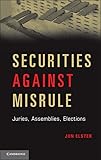Securities against misrule :
Material type: TextPublication details: Cambridge New York Cambridge University Press, 2013Description: xii, 324 pISBN: 9781107031739 (hardback); 9781107649958 (paperback)Subject(s): Representative government and representation | Group decision making | Abuse of administrative power | Political theory - history & theoryDDC classification: 302.3 Summary: "This book proposes a normative theory of collective decision making, inspired by Jeremy Bentham but not including his utilitarian philosophy. The central proposal is that in designing democratic institutions one should reduce as much as possible the impact of self-interest, passion, prejudice, and bias on the decision makers, and then let the chips fall where they may. There is no independently defined good outcome that institutions can track, nor is there any way of reliably selecting good decision makers. In addition to a long initial chapter that surveys theories of collective decision making, notably social-choice theory, and a chapter expounding and discussing Bentham,Ŵs views, historical chapters on the jury, constituent assemblies, and electoral systems develop and illustrate the main ideas. This work draws on a welter of case studies and historical episodes, from Thucydides and Plutarch to the present. It is also grounded in psychology, behavioral economics, and law"--
TextPublication details: Cambridge New York Cambridge University Press, 2013Description: xii, 324 pISBN: 9781107031739 (hardback); 9781107649958 (paperback)Subject(s): Representative government and representation | Group decision making | Abuse of administrative power | Political theory - history & theoryDDC classification: 302.3 Summary: "This book proposes a normative theory of collective decision making, inspired by Jeremy Bentham but not including his utilitarian philosophy. The central proposal is that in designing democratic institutions one should reduce as much as possible the impact of self-interest, passion, prejudice, and bias on the decision makers, and then let the chips fall where they may. There is no independently defined good outcome that institutions can track, nor is there any way of reliably selecting good decision makers. In addition to a long initial chapter that surveys theories of collective decision making, notably social-choice theory, and a chapter expounding and discussing Bentham,Ŵs views, historical chapters on the jury, constituent assemblies, and electoral systems develop and illustrate the main ideas. This work draws on a welter of case studies and historical episodes, from Thucydides and Plutarch to the present. It is also grounded in psychology, behavioral economics, and law"--
| Item type | Current library | Call number | Status | Date due | Barcode |
|---|---|---|---|---|---|
 BK
BK
|
Stack | 302.3 ELS/S (Browse shelf (Opens below)) | Available | 37066 |
Browsing Kannur University Central Library shelves, Shelving location: Stack Close shelf browser (Hides shelf browser)
"This book proposes a normative theory of collective decision making, inspired by Jeremy Bentham but not including his utilitarian philosophy. The central proposal is that in designing democratic institutions one should reduce as much as possible the impact of self-interest, passion, prejudice, and bias on the decision makers, and then let the chips fall where they may. There is no independently defined good outcome that institutions can track, nor is there any way of reliably selecting good decision makers. In addition to a long initial chapter that surveys theories of collective decision making, notably social-choice theory, and a chapter expounding and discussing Bentham,Ŵs views, historical chapters on the jury, constituent assemblies, and electoral systems develop and illustrate the main ideas. This work draws on a welter of case studies and historical episodes, from Thucydides and Plutarch to the present. It is also grounded in psychology, behavioral economics, and law"--








There are no comments on this title.